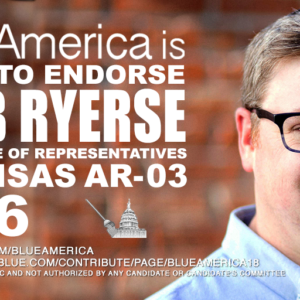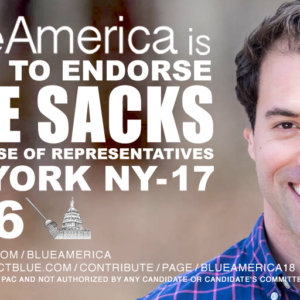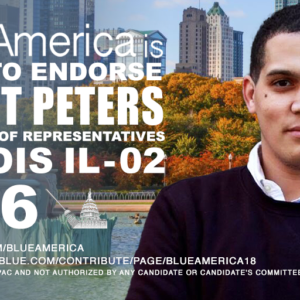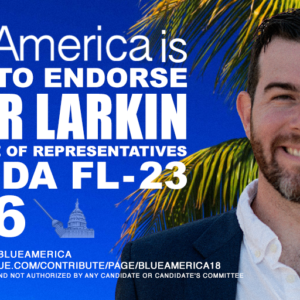We had been planning to spend our Blue America session today talking with an old friend, Alan Grayson, but Alan suggested we move his date back and talk with another old friend, North Carolina Congressman Brad Miller. Blue America isn’t looking for incumbents to endorse this cycle–unless they’re really good… and really in trouble. Brad has been really good for a very long time and the Art Pope-funded North Carolina state legislature just cut his district to shreds, pushing him into a tough primary. He needs help. When Grayson suggested we have him here today he told us that “Brad Miller is exactly what people hope that their representatives will be: thoughtful, independent, selfless, smart, and completely committed to their wellbeing. There are very few Members of Congress who are willing to tell a well-connected lobbyist to get lost; Brad is one of them.” But we knew that from last time we had Brad over for a chat.
Brad serves on the House Financial Services Committee– the reason he and Grayson were pals– and once disquieted many of his colleagues by writing
“The interests of the financial industry and those of working- and middle-class families appear irreconcilable. That doesn’t leave much room for consensus. Congress may just need to pick a side: the financial industry or working- and middle-class families. Why not put it to a vote?”
That’s not a vote conservatives– of either party– are eager to ever see happen. This week Brad introduced the Freedom And Mobility Banking Act of 2011 in response to the new policy of big banks punishing consumers with higher debit card fees. It aims to give real choices by modernizing and streamlining the opening and closing of personal checking and savings accounts. Brad:
“As megabanks flirt with menus of new fees, an increasing number of Americans will want to switch banks. That is the way things work in a competitive, free market as unrepentant banks are still trying to rake in vulgar profits from their customers… Because of financial reforms, banks are unable to rely on the cash flow of practices like double-cycle credit card billing, compulsory overdraft programs, or unregulated debit swipe fees. Bank executives are coming up with some innovative ways to protect their offensively large salaries.”
Even if you didn’t get a small-print notice in the mail, you probably read that HSBC informed its customers that it is eliminating their free checking accounts which will now carry a monthly maintenance fee of $15. Wells Fargo, one of the four largest consumer banks in the country, also eliminated free checking and, most recently, Bank of America, one of the largest recipients of U.S. taxpayer bailouts, announced it would charge customers a new $5 monthly fee for using their debit cards– even if it’s for a single $2 purchase.
While other members of the Financial Services Committee were currying favor with banksters and their lobbyists during the writing of reform legislation, Brad was the leader of the small progressive contingent fighting– against these well-heeled interests– to protect consumers. Just listen to his floor speech above. He has always seen his service on consumer protection as an opportunity “to comfort the afflicted. And my work on science and technology oversight gives me the chance to afflict the comfortable.” A frank interview on the mortgage crisis in the NY Times business section didn’t exactly endear him to the Big Money interests on Wall Street or K Street. “These mortgages were not designed to increase homeownership; they were designed to trap people in debt and strip the equity in their home as home prices appreciated. For the financial industry, that increasing wealth from middle-class homeowners was an attractive target; if they could trap families in a cycle of borrowing every three years or so, then a lot of increased wealth in their homes would end up in the financial sector rather than with those families.”
“Mr. Miller recognizes,” opined Gretchen Morgenson, “that his is an uphill climb because the big banks have many friends in high places across Washington. ‘Americans have come away from this persuaded that everything has been done to help the banks and not to help them,’ he said. ‘And in a democracy, that’s a real problem’.”
Outspoken and straight-shooting, Brad didn’t run and hide when the Republicans started shrieking “Class War!” He came right back at ’em:
The right dismisses concerns about income inequality as “class warfare.” Yet it has played the middle class’s economic anxieties for political advantage by stoking resentment of the poor. The right is happy now to have a high-stakes struggle over whether to cut Social Security benefits of the top three-fifths to spare the benefits of the bottom two-fifths– with no one questioning that benefits must be cut.
But that’s the wrong fight. The correct fight would put 99 percent of Americans on the same side of the barricades.”
And when Grayson told us Miller was one of the only Members of Congress who tells fat cat lobbyists to get lost, it’s something his own constituents are well aware of and have admired him for. “I’m frustrated with how hard it is to get things through. I’m frustrated with how much influence, how much power, some of the industries that should be completely discredited still have. I had hoped for more of a hundred days kind of public support; that given where the economy was, given how much how had gone wrong, that there would be a strong force behind some pretty fundamental reform. Certainly, getting consumer protection through is a knife fight.” That was in 2009. Please join us below in the comments section at 2pm (ET) to talk with Brad about what’s happened since– and where things are headed next.
And, again, if you’d like to help keep a deserving incumbent in Congress– and there aren’t many– you can do so here.








Comments